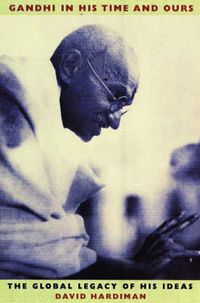
1 säljare
Gandhi in His Time and Ours
Gandhi was the creator of a radical style of politics that has proved effective in fighting insidious social divisions within India and elsewhere in the world. How did this new form of politics come about? David Hardiman shows that it was based on a larger vision of an alternative society, one that emphasized mutual respect, resistance to exploitation, nonviolence, and ecological harmony. Politics was just one of the many directions in which Gandhi sought to activate this peculiarly personal vision, and its practice involved experiments in relation to his opponents. From representatives of the British Raj to Indian advocates of violent resistance, from right-wing religious leaders to upholders of caste privilege, Gandhi confronted entrenched groups and their even more entrenched ideologies with a deceptively simple ethic of resistance. Hardiman examines Gandhi's ways of conducting his conflicts with all these groups, as well as with his critics on the left and representatives of the Dalits. He also explores another key issue in Gandhi's life and legacy: his ideas about and attitudes toward women. Despite inconsistencies and limitations, and failures in his personal life, Gandhi has become a beacon for posterity. The uncompromising honesty of his politics and moral activism has inspired such figures as Jayaprakash Narayan, Medha Patkar, Martin Luther King Jr., Nelson Mandela, and Petra Kelly and influenced a series of new social movements-by environmentalists, antiwar campaigners, feminists, and human rights activists, among others-dedicated to the principle of a more just world.
Utgiven: 2004
ISBN: 9781850657118
Förlag: C Hurst & Co Publishers Ltd
Format: Häftad
Språk: Engelska
Sidor: 320 st
Gandhi was the creator of a radical style of politics that has proved effective in fighting insidious social divisions within India and elsewhere in the world. How did this new form of politics come about? David Hardiman shows that it was based on a larger vision of an alternative society, one that emphasized mutual respect, resistance to exploitation, nonviolence, and ecological harmony. Politics was just one of the many directions in which Gandhi sought to activate this peculiarly personal vision, and its practice involved experiments in relation to his opponents. From representatives of the British Raj to Indian advocates of violent resistance, from right-wing religious leaders to upholders of caste privilege, Gandhi confronted entrenched groups and their even more entrenched ideologies with a deceptively simple ethic of resistance. Hardiman examines Gandhi's ways of conducting his conflicts with all these groups, as well as with his critics on the left and representatives of the Dalits. He also explores another key issue in Gandhi's life and legacy: his ideas about and attitudes toward women. Despite inconsistencies and limitations, and failures in his personal life, Gandhi has become a beacon for posterity. The uncompromising honesty of his politics and moral activism has inspired such figures as Jayaprakash Narayan, Medha Patkar, Martin Luther King Jr., Nelson Mandela, and Petra Kelly and influenced a series of new social movements-by environmentalists, antiwar campaigners, feminists, and human rights activists, among others-dedicated to the principle of a more just world.
Begagnad bok
160 kr
Fri frakt & skickas inom 1-3 vardagar
Köpskydd med Studentapan
Varje köp täcks av Studentapans köpskydd som säkerställer att boken kommer fram, att du får rätt bok och att skicket stämmer överens med beskrivning.



